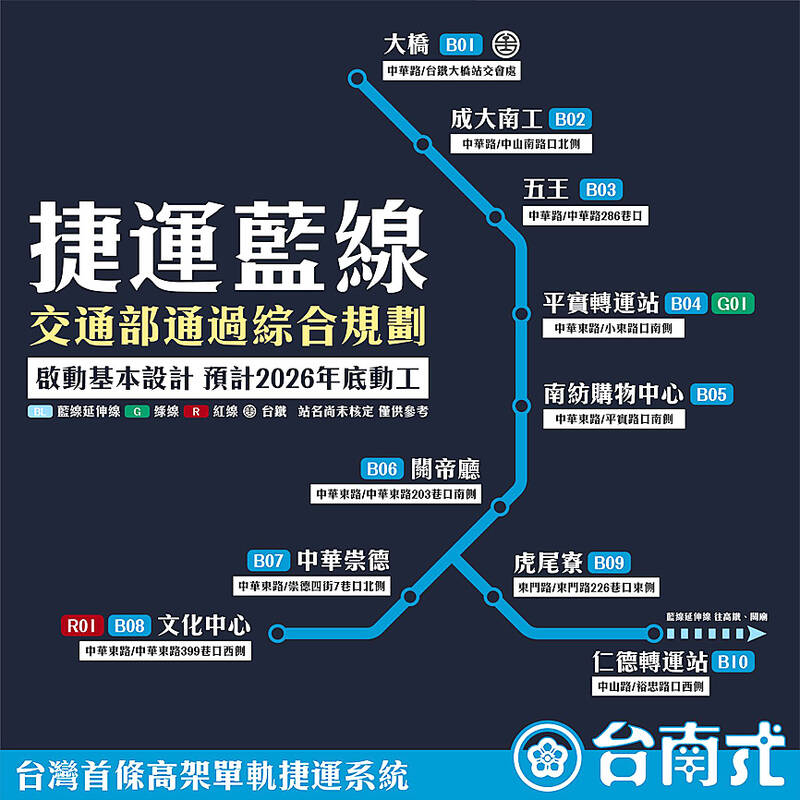The Ministry of Transportation and Communications (MOTC) on Thursday approved plans for the Tainan MRT, which is slated to start construction in 2026 and commence operations in 2031.
The ministry’s committee convened to review the initial phase of the Tainan MRT Blue Line — which would connect the city’s railway network and technology park — and approved the MRT system design, cost, route, evacuation planning and other details, the Tainan Bureau of Transportation said, adding that the Tainan City Government would revise the plans and submit a final proposal to the ministry, which it then would submit to the Executive Yuan for further assessment.
The Blue Line would be a cornerstone of the city’s MRT network, with future lines connecting key areas, bolstering Tainan’s status as a technological hub, Tainan Mayor Huang Wei-che (黃偉哲) said.

Photo courtesy of the Tainan Style Facebook group
It is to span 8.93km and traverse Yongkang (永康), East (東區) and Rende (仁德) districts, featuring 10 stations and a maintenance facility, Bureau Director-General Wang Ming-te (王銘德) said, adding that the project also passed a review by a Ministry of Environment task force on Feb. 23.
He also said that the ministry plans to hold a review meeting to discuss the future development of the Dark Green, Red and Green lines in the city, aiming to enhance Tainan’s MRT infrastructure.

A preclearance service to facilitate entry for people traveling to select airports in Japan would be available from Thursday next week to Feb. 25 at Taiwan Taoyuan International Airport, Taoyuan International Airport Corp (TIAC) said on Tuesday. The service was first made available to Taiwanese travelers throughout the winter vacation of 2024 and during the Lunar New Year holiday. In addition to flights to the Japanese cities of Hakodate, Asahikawa, Akita, Sendai, Niigata, Okayama, Takamatsu, Kumamoto and Kagoshima, the service would be available to travelers to Kobe and Oita. The service can be accessed by passengers of 15 flight routes operated by

Chinese spouse and influencer Guan Guan’s (關關) residency permit has been revoked for repeatedly posting pro-China videos that threaten national security, the National Immigration Agency confirmed today. Guan Guan has said many controversial statements in her videos posted to Douyin (抖音), including “the red flag will soon be painted all over Taiwan” and “Taiwan is an inseparable part of China,” and expressing hope for expedited reunification. The agency last year received multiple reports alleging that Guan Guan had advocated for armed reunification. After verifying the reports, the agency last month issued a notice requiring her to appear and explain her actions. Guan

GIVE AND TAKE: Blood demand continues to rise each year, while fewer young donors are available due to the nation’s falling birthrate, a doctor said Blood donors can redeem points earned from donations to obtain limited edition Formosan black bear travel mugs, the Kaohsiung Blood Center said yesterday, as it announced a goal of stocking 20,000 units of blood prior to the Lunar New Year. The last month of the lunar year is National Blood Donation Month, when local centers seek to stockpile blood for use during the Lunar New Year holiday. The blood demand in southern Taiwan — including Tainan and Kaohsiung, as well as Chiayi, Pingtung, Penghu and Taitung counties — is about 2,000 units per day, the center said. The donation campaign aims to boost

The Central Weather Administration (CWA) said a magnitude 4.9 earthquake that struck off the coast of eastern Taiwan yesterday was an independent event and part of a stress-adjustment process. The earthquake occurred at 4:47pm, with its epicenter at sea about 45.4km south of Yilan County Hall at a depth of 5.9km, the CWA said. The quake's intensity, which gauges the actual effects of a temblor, was highest in several townships in Yilan and neighboring Hualien County, where it measured 4 on Taiwan's seven-tier intensity scale, the CWA said. Lin Po-yu (林柏佑), a division chief at the CWA's Seismological Center, told a news conference